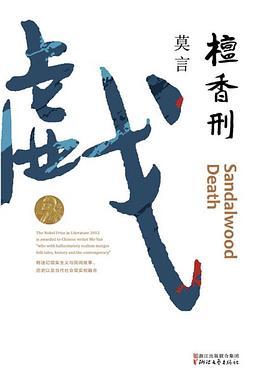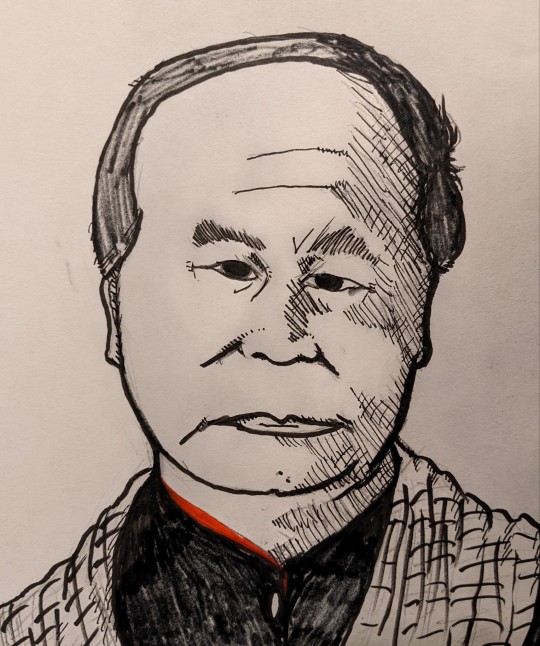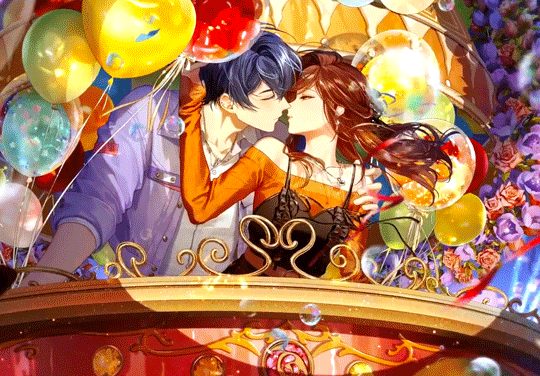#Mo Yan
Text


The Fragments of Kylin (2024)
— ep. 15
#cdrama#cdramas#the fragments of kylin#the fragments of kylin cdrama#yang xi zi#sun chen jun#shi si#mo yan#need a man to wipe my tears fr
14 notes
·
View notes
Text












Mo Yan. Herta Müller. Jean-Jacques Rousseau. Lao Tzu. Seamus Heaney. Claude Simon. Octavio Paz. John Stuart Mill. Gabriel Garcia Marquez. John Locke. Orhan Pamuk. Naguib Mahfouz.
#literature#poetry#quotes#writeblr#writing prompt#star signs#zodiac signs#mo yan#herta muller#jean jacques rousseau#lao tzu#seamus heaney#claude simon#octavio paz#john stuart mill#gabriel garcia marquez#john locke#orhan pamuk#naguib mahfouz
14 notes
·
View notes
Text

29 notes
·
View notes
Text
I was really fascinated by how Mo Yan’s Life and Death are Wearing Me Out takes the Buddhist concept of stubborn attachment to things keeping one in a cycle of suffering, by actually using a plot device of Buddhist afterlives and reincarnation, and does something of a (in TvTropes style-terms) deconstruction and then reconstruction of the concept, first showing how stubbornness can be virtue and even a heroic or redeeming quality in a world where it is easier to accept cruel changes for one’s own greed and benefit, and adaptability can be cowardice, but showing in the end how it cannot be the ultimate solution and the Buddhist view has wisdom after all.
The beginning of this book plays on the typical trope of a wealthy, grouchy, unlikeable type of person reincarnating into an animal (in this case, multiple animals in a row) as a punishment and being forced to learn humility. Except while Ximen Nao is certainly proud, judgmental and spiteful of his enemies and fits into the archetype in a lot of ways, his reasoning for continuing to declare his innocence even under torture by lord Yama is far more sympathetic than is typical for that archetype.. It is a protest of the inexplicable, monstrous injustices of earth being seemingly repeated in the afterlife, by beings of supposed justice. However likable or not he seems as a person, his point that he did his best to not take advantage of his prosperity to harm others and even went out of his way to help the less fortunate, yet is still executed on trumped-up charges and thrown in the box of other more tyrannical people in his position for being a landlord, is a strong one. Yama can claim to be detached from the earth’s justice, but the very act of trying to teach people to eradicate stubbornness and accept change without attachment would seem to encourage those unfortunate enough to be victims of the earth’s justice systems to accept being trod upon and groundlessly declared guilty; in effect, such a system appears to just be a patsy for whatever the earthly systems of the time are.
So throughout his first two animal lifetimes, Ximen Nao starts by refusing the drink that will make him forget his struggles, so he can stubbornly maintain his human memories and resentments, and struggles between his human mind bitterness about being forced to be an undignified animal and the animal mind and qualities he takes on, which are more happy and accepting of the life he leads. And he finds a partner in his resistance to the changing times, Lan Lian, who he serves loyally both as a donkey and as an ox. Lan Lian fights hard to be the only independent farmer in China, despite opposition, and this is where the antithesis of the Buddhist idea, the nobility of stubbornness, becomes clear. If Ximen Nao bewailed his execution and his loss of wealth and status that came with reincarnation, but then easily adapted to doing whatever he could to have as much pleasure and wealth (metaphorically, if we are talking about him as an animal) as he could in a new life in China’s new system, then it would only be his personal, self-serving loss that he complained about and there would be no nobility in it. But by stubbornly taking a stand, even enduring horrible torture to do so, instead of taking the first opportunity to rebuild his own happiness, it shows his objection is based on a greater principle, and this lends at least the appearance of virtue to his actions. And this thread climaxes at the end of Ximen Nao’s second life as an ox, where his loyalty to Lan Lian and refusal to work for the commune to the point of a horrific death makes him be seen by the people of his village as a sort of Buddhist folk hero. The paradigm the book started out with, of reincarnation to learn to adapt and not be attached, is inverted, and stubbornness is seen as the Buddhist ideal.
This theme is seen not just in Ximen Nao and Lan Lian, but in other characters who similarly stick to their ideals even at the cost of personal loss. Hong Taiyue, in being a true believer in communism not just when it gives him power and allows him to lord over and punish others but when he sees the world giving lipservice to his ideas while following capitalism and forgetting what they once believed in, is possessed of a certain virtue that Jinlong, who equally uses communism as an excuse for cruelty but takes the “easy route” of betraying his father to rise in the ranks and adapts with the time to capitalism when this allows him to remain wealthy and politically powerful, does not. With regards to Lan Jiefang, we have the author inserting himself into the book as the perpetual gadfly Mo Yan explicitly stating the paradox of stubbornness – abandoning his family for an affair with a much younger woman is undoubtably cruel, but in being completely stubborn about it and willing to sacrifice everything he has – a home, prestige, the love of his family – for it, he also proves to be not just a common person “trading up” for a younger, prettier woman for personal gain, and by showing he values a principle more than personal gain he becomes, in the fictional Mo Yan’s semi-ironic view, a hero.
Another thing I think is interesting in the narrative framing’s handling of stubborn characters is that it never resorts to telegraphing a stubborn character’s righteousness by giving them an air of enhanced dignity even when the world judges them, with those who threaten them getting a “pie in the face” by the narrative even as they maintain their worldly power. No, to be stubborn is to invite the ridicule of not just earthly powers but of a universe that demands adaptability, regardless of what your cause is. Even if, like Lan Lian, in the future your endurance will survive and prove those who tormented you wrong, in the long time before that your suffering will not be noble and tragic but pathetic and darkly comical, like in the scene where he gets red paint in his eyes. Hong Taiyue, Lan Jiefang, Ximen Nao in his dealings with the afterlife, all get to fall flat on their faces for their attempts to resist. (Even the author inserting himself into the story not only gets humiliated constantly by the narrative, but gets just about the worst humiliation of everyone).
In the second half of the book, Lan Lian and Ximen Nao are set up as mirrors of each other, two beings who started in the same place with the same goals but must take different paths. Because Ximen Ox sacrifices his life in a display of unyielding courage, and is praised as a Buddhist model for it, and then… life still goes on. Due to the cycle of reincarnation there is no climactic apotheosis of nobility that ends everything, and it is impossible to remain in his stubbornness forever. Lan Lian goes on with his determination, Ximen Nao must adapt to his new life as a pig. And in the short term, this is a form of corruption; when Pig Sixteen can no longer bear to starve himself in protest and allows himself to just live and enjoy life as is natural for a pig, abandoning his human judgment of it being humiliating, he grows crude and greedy. He does not just eat, he pushes aside his siblings and leaves them to starve, and mutilates his mother by the fervor of his suckling. He takes everything from Diao Xiaosan and leads to the rival pig’s downfall due to his desire for a harem. In eating and fattening up, he is considered a revolutionary pig, by being an emblem of the success of farming he is a “cannon launched into the reactionaries”, even as ironically his harem is compared by the narrative to that of an emperor. This makes it clear that whoever is in power, the ideal person (or pig) in their society is someone who is greedy for more and, should their victory be thwarted, adapts to the new system and seeks physical success and pleasure within it rather than stubbornly resenting what they have lost and taking a principled stand.
But in the last sections of the book, it becomes clear that Ximen Nao’s spiritual fulfillment does not depend on remembering his stubborn values again at all. Without reverting to that state, in fact while becoming even more adaptable and fully embracing his life as a pig, he feels regret for his treatment of Diao Xiaosan and grows to love and respect him, and he ultimately dies to save children, even those he had no connection to in his human life, feeling nothing but warmth and happiness about how his life ended. And this is where the ultimate vision of the book becomes clear. For while it is true that if one is of the temperament to value storing up physical goods most in life, reacting to losing those goods unjustly by fighting for the principle that it was unjust is more noble and heroic than taking the cowardly route of abandoning principle to continue to flourish, why should one assume that this temperament is the best way to live life in the first place?
The alternative to both stubbornness and greed that the book proposes can be described as something like melancholy. It’s a perspective that first comes to Ximen Nao during their time of starvation in the winter as a pig, one he admits is unfamiliar to him until that moment because he is “not a melancholy pig” – a perspective where one’s appreciation of life is more complex than just feeling gratified when you get money or food or a harem and feeling bitter and resentful when you do not, where even sadness and loss has its value. And it’s one that reaches its climax during the scene near the end where, as a dog, he sits by the graves of all of his previous lives and feels a bittersweet sadness, mixed with love and acceptance, over his old memories, showing how much he has changed. And it is shortly after that where Yama, acknowledging he has let go of his hate, allows him to once again be reborn as a human. In the end, the vision of stubbornness in this book is that of a “local maximum” so to speak, a mode of existence that is the best, most heroic representation of a blunt mindset without melancholy, but one that must eventually be escaped for true enlightenment, because that mindset as a whole must be escaped. The only way out is through, then, through greed and cruelty and into something better.
5 notes
·
View notes
Text

[الضّفــادع - مو يان]
"This is history, and history is all about the effects, not what caused them. One looks at the Great Wall of China or the Egyptian pyramids without thinking about the bleached bones buried under these magnificent edifices"
-Mo Yan
12 notes
·
View notes
Text
“Es verdad, el dinero no lo puede todo —pensé— pero el que no tiene dinero no puede nada”
Cambios, Mo Yan
2 notes
·
View notes
Text

the book is called 'The Land of Vodka' in the translation I have (borrowed from the library)
the book so far matches the title and the short blurb description on the back so much that I don't know what to feel
0 notes
Text
"The colors emanating from your eyes are incredibly moving. Only people who speak to God can create colors like that. You see signs we cannot see, you hear sounds we cannot hear, you smell odors we cannot smell. What grief we feel! When speech streams from that organ called your mouth, it is like a melody, a rounded, flat river, a silken thread from the rear end of a spider waving gossamerlike in the air, the size of a chicken's egg, just as smooth and glossy and every bit as wholesome. We are intoxicated by that music, we frost in that river, we dance on that silken spider thread, we see God. But before we see Him, we watch our own corpses float down the river..."
0 notes
Text


1 note
·
View note
Text
Vaš stav suočavanja s prošlosti i preuzimanja odgovornosti za određene postupke sve nas je duboko dirnuo. Čini se da ste i Vi bili žrtva rata. U svome pismu pisali ste o tome kako ste Vi i Vaša majka patili i strahovali tijekom rata i nakon rata bili izloženi gladi i hladnoći. Ako želite istinu, Vaš otac također je bio žrtva. Kao što ste rekli, da nije bilo rata, bio bi kirurg sa svijetlom budućnosti. Rat je sve to promijenio; njegov život i njegova ljudska priroda nikada vi��e neće biti isti. Nekoć je spašavao živote, a pretvorio se u osobu koja ih oduzima.
Pročitao sam Vaše pismo svojoj tetki, ocu i mnogima koji su proživjeli rat. Njihove reakcije bile su emotivne, čak su i zaplakali. Vi niste mogli imati više od četiri, pet godina kad je Vaš otac postao zapovjednik garnizona u Pingduu i niste krivi za njegove zločine. Ali nosili ste njegove zločine na ramenima i demonstrirali ste volju da ih okajete umjesto njega. Čineći to, omilili ste nam se, jer znam koliko je takav stav vrijedan. Taj se stav danas vrlo rijetko viđa. Kad bi svi ljudi mogli promisliti o prošlosti i o vlastitim životima, ne bi bilo toliko besmislenog ponašanja.
Žabe, Mo Yan
0 notes
Text

The Fragments of Kylin (2024)
— ep. 15
#cdrama#cdramas#the fragments of kylin#the fragments of kylin cdrama#yang xi zi#sun chen jun#shi si#mo yan
8 notes
·
View notes
Text
Desde aquele momento até agora, e para sempre, meu coração é todo teu. Se quiseres comê-lo, não hesitarei em arrancá-lo para depositá-lo em tuas mãos… Fascinam-me teu rosto corado, teu nariz vívido, teus lábios delicados, teus cabelos em desalinho, teus olhos brilhantes, fascinam-me tua voz, teu cheiro, teu sorriso. Esse teu sorriso me dá vertigem, vontade de me ajoelhar no chão, abraçar tuas pernas e admirar teu rosto risonho. Aonde fores, irei também, vou me ajoelhar no chão para beijar as tuas pegadas, e ficarei em pé diante da tua janela fitando a luz dentro do quarto, do momento em que ela se acende até o momento em que se apaga, quero ser uma vela e queimar por ti, queimar até o fim. Minha adorada, se eu morrer por ti cuspindo sangue e me concederes a graça de lançar um olhar à minha sepultura, já estarei realizado. Se derramares por mim uma lágrima que seja, já não terei morrido em vão, tua lágrima, minha adorada, há de ser o elixir milagroso que me devolverá à vida.
0 notes
Text
"I wrote the asinine words ‘liquor is literature’ and ‘people who are strangers to liquor are incapable of talking about literature’ when I was good and drunk, and you must not take them to heart."
--Mo Yan, The Republic of Wine

0 notes
Text
La Riflessione, Sorgo rosso
La Riflessione, Sorgo rosso
Una soffitta dei ricordi, tutti vividi, ricchi di colori, suoni, odori: il libro di Mo Yan Sorgo rosso
di Ettore Sannino
Sorgo rosso di Mo Yan non può essere semplicemente definito un romanzo.
È piuttosto un mito, un’epopea, una storia narrata in prima persona ma come racconto dapprima custodito e poi da tramandare.
I protagonisti sono altri, forse uno è il principale, o forse due, o forse tre, o…

View On WordPress
0 notes
Text








[CN Server Spoilers]
4TH ANNIVERSARY SSR CARDS
#tears of themis spoilers#tot spoilers#tears of themis#artem wing#vyn richter#luke pearce#marius von hagen#zuo ran#mo yi#xia yan#lu jinghe#rosa qiangwei#dailygaming#gamingedit#laciefuyu edits
460 notes
·
View notes
